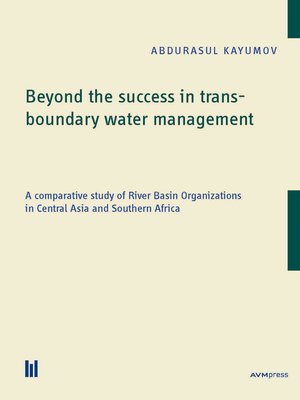Beyond the success in transboundary water management
ebook ∣ A comparative study of River Basin Organizations in Central Asia and Southern Africa
By Abdurasul Kayumov

Sign up to save your library
With an OverDrive account, you can save your favorite libraries for at-a-glance information about availability. Find out more about OverDrive accounts.
Find this title in Libby, the library reading app by OverDrive.



Search for a digital library with this title
Title found at these libraries:
| Library Name | Distance |
|---|---|
| Loading... |
Today, when so many countries share the same transboundary river basins, unilateral water management becomes extremely critical. Joint water management, on the other hand, faces many obstacles, because of states' interests in particular function of the water. Water is needed for drinking, household, irrigation, hydro-energy, fishing, navigation, tourism as well as many other purposes, and unfortunately, it cannot meet all needs simultaneously. The satisfaction of one need often impedes the others. In this regard, transboundary river basins often create challenges among states by leading them to negotiate in asymmetric relations.This book is an attempt to address the effectiveness of transboundary water management from a social and political perspective by offering new theoretical underpinnings to understand the success conditions in sharing transboundary water resources. The author focused in the work on three conditions, i.e. institutional conditions and country specific conditions, as well as conditions of regional integrity level and role of external actors. The proposed conditions were tested on two river basins i.e. the successful one in the example of Orange/Senqu river basin and unsuccessful one in the case of Naryn/Syrdarya river basin.







